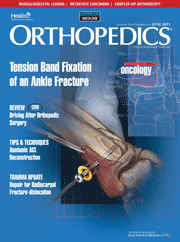
SHOULDER & ELBOW
Benefits of simulation vs. standard training for residents performing shoulder arthroscopy
This report has been verified
by one or more authors of the
original publication.
Orthopedics. 2016 May 1;39(3):e479-85
22 orthopaedic surgery residents were randomized into either a simulation group or a standard training group without simulator training to practice arthroscopic shoulder procedures. The purpose of this study was to determine if simulation technology in the graduate medical curriculum would be beneficial in improving resident expertise for shoulder arthroscopy, as assessed using the Arthroscopic Surgery Skill Evaluation Tool (ASSET) score. Findings indicated faster operative times, improved probe distances, and patient safety in the simulation group compared to the standard practice group.
Unlock the full ACE Report
You have access to {0} free articles per month.Click below to unlock and view this {1}
Unlock NowCritical appraisals of the latest, high-impact randomized controlled trials and systematic reviews in orthopaedics
Access to OrthoEvidence podcast content, including collaborations with the Journal of Bone and Joint Surgery, interviews with internationally recognized surgeons, and roundtable discussions on orthopaedic news and topics
Subscription to The Pulse, a twice-weekly evidence-based newsletter designed to help you make better clinical decisions
Exclusive access to original content articles, including in-house systematic reviews, and articles on health research methods and hot orthopaedic topics
Or upgrade today and gain access to all OrthoEvidence content for just $1.99 per week.
Already have an account? Log in


Subscribe to "The Pulse"
Evidence-Based Orthopaedics direct to your inbox.
{0} of {1} free articles
Become an OrthoEvidence Premium Member. Expand your perspective with high-quality evidence.
Upgrade Now













































































